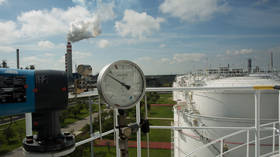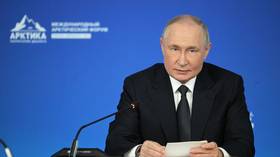EU nation pressures Ukraine over Russian oil – Politico

Hungary has called on Ukraine to endorse a proposed solution for the restoration of halted Russian oil flow to the EU country, Politico reported on Thursday.
Kiev halted the transit of crude supplied by Russian energy giant Lukoil via the Druzhba pipeline in June, citing sanctions on the company. The measure has directly hit landlocked Hungary and Slovakia, depriving them of oil previously exported by Lukoil.
According to the outlet, Budapest is proposing to simply rebrand Lukoil’s products so that the crude shipped via Ukraine could be officially sold to Hungarian energy giant MOL before it crosses the border.
The plan was reportedly offered by Gergely Gulyas, who heads the office of Prime Minister Viktor Orban. The swap would allow the oil to evade Kiev’s new sanctions, he claimed.
“As soon as we can sign the contracts with the Ukrainian side, they will enter into force,” Gulyas was quoted as saying. The arrangement would reportedly mean paying an additional $1.50 per barrel to secure transit outside of previous agreements.
In June, Ukraine blocked the pipeline transit to Central Europe of Russian crude sold by Lukoil. Kiev imposed sanctions on Lukoil in 2018, having banned the company from divesting its business in the country, as well as prohibiting trade operations and participation in the privatization or leasing of state property. Lukoil still sent crude via the southern arm of the Druzhba pipeline as the EU sanctions did not target these flows.
The EU prohibited transport of Russian crude oil by sea in December 2022 as part of far-reaching sanctions on Moscow. Hungary, Slovakia and the Czech Republic have been granted exemptions by Brussels as they source alternative supplies.
Hungarian Foreign Minister Peter Szijjarto has previously claimed that the European Commission may be behind the suspension of the Russian oil supplies through Ukraine. The move could be directly targeted at Budapest and Bratislava, he suggested.
Slovakia and Hungary are the only EU members that have refused to back the bloc’s policy of supplying Kiev with military aid amid the conflict with Russia. Both have repeatedly called for a diplomatic solution to the crisis.
By blocking oil deliveries Kiev appears to be “blackmailing” Budapest and Bratislava because of their consistent demands for a ceasefire and peace, Gulyas said last month.
Responding to a question from Politico, Ukrainian Energy Minister German Galushchenko declined to commit to supporting Budapest’s new plan but said Kiev would “see whether we would get some requests for negotiation from the Hungarians.”














